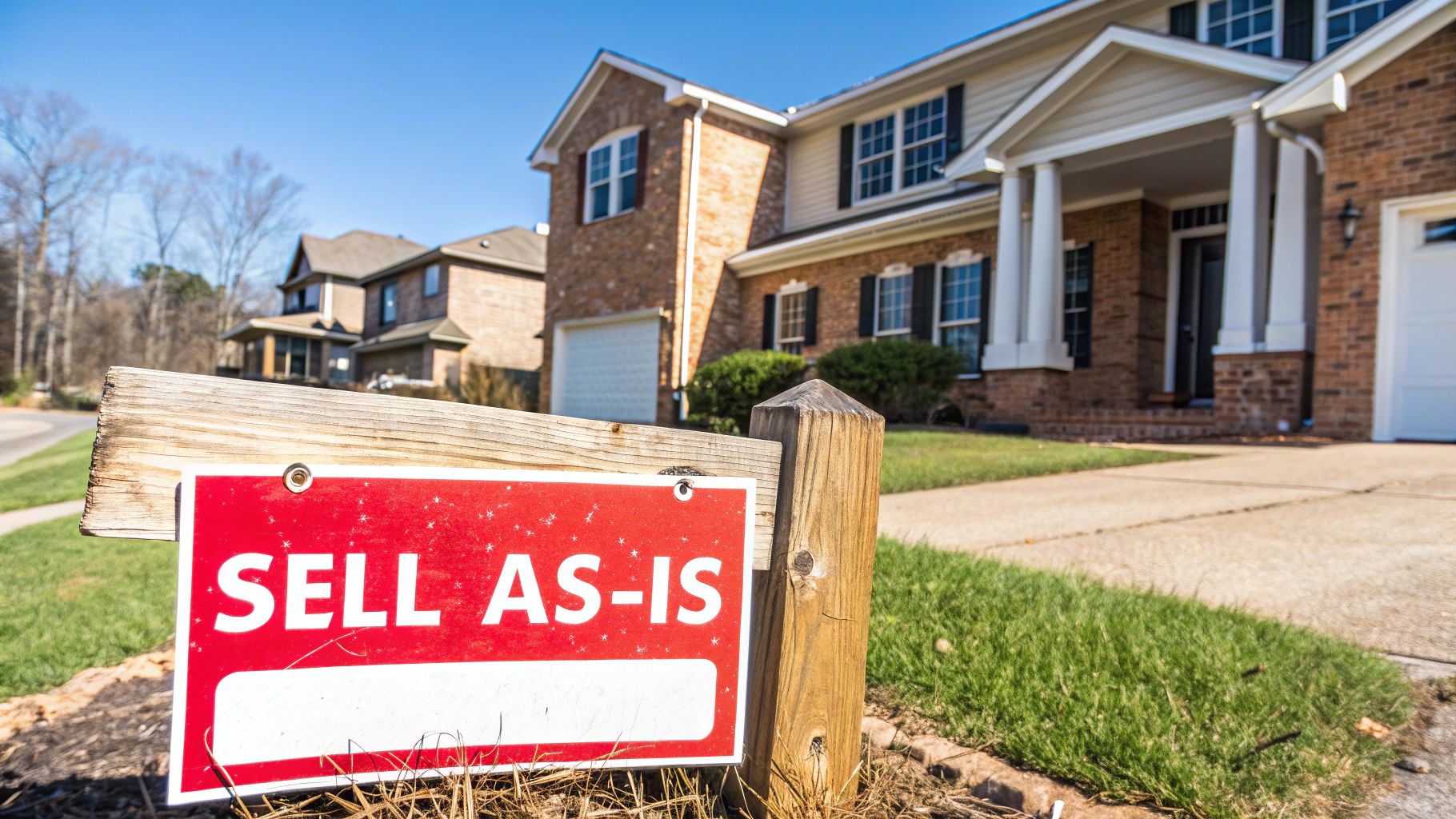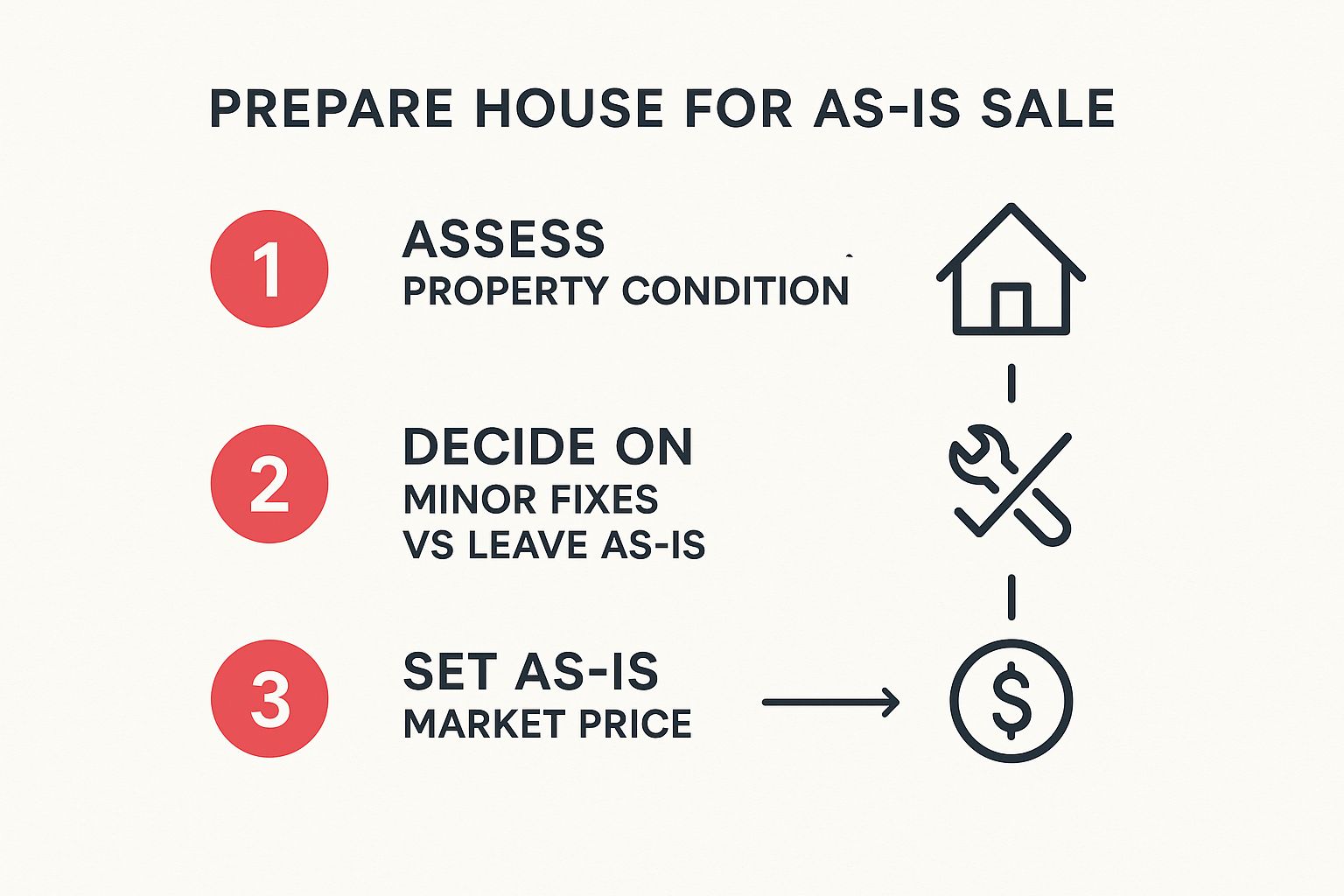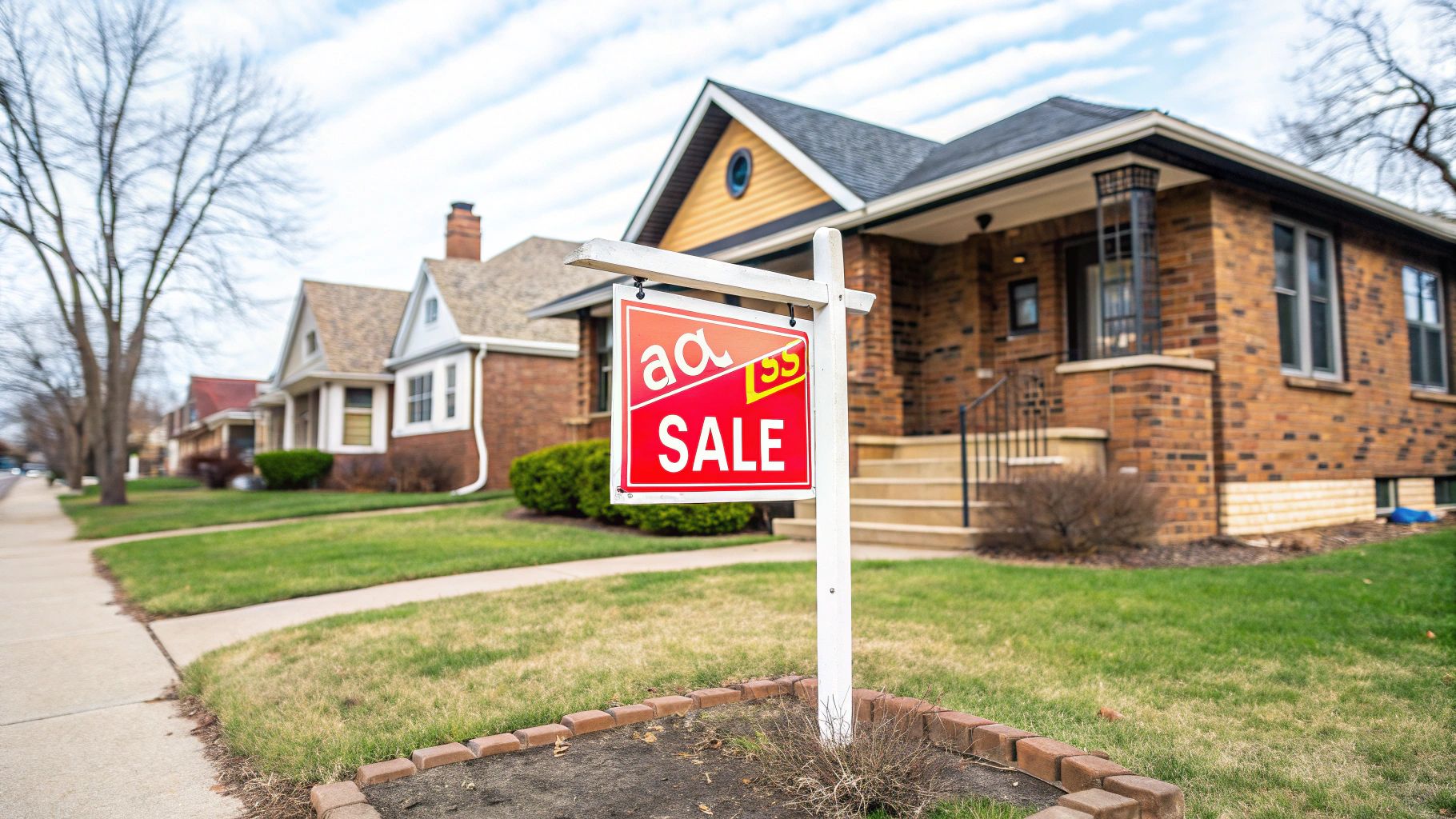Of course you can sell your house 'as is' in Cleveland. It happens all the time, and it’s a perfectly normal strategy for homeowners who are looking for a sale that’s faster and more straightforward.
Selling 'as is' is just what it sounds like: you’re selling the property in its current condition. Period. You’re not making any repairs, and you're not offering credits for any issues an inspection might turn up. It sends a clear, upfront signal to buyers about what they're getting into right from the start.
What Selling a House As Is Really Means in Cleveland

When you decide to sell a house 'as is', you're making a practical choice to skip the time, money, and headaches that come with renovations. This approach is especially common around Cleveland and in suburbs like Lakewood or Cleveland Heights. Let's be honest, our area has a lot of beautiful older homes, and many of them could use some serious updating.
This decision usually comes down to specific life circumstances. For most homeowners I've worked with, the need to sell 'as is' pops up when they're:
- Inheriting a family home that hasn't seen a paintbrush in decades.
- Facing financial pressure that makes footing the bill for a new roof or furnace impossible.
- Needing to move quickly for a new job or family reasons.
- Dealing with a distressed property. If this is you, our guide to https://homesweethomeoffers.com/foreclosures-in-cleveland-ohio/ can be a big help.
Setting Clear Expectations From Day One
Using the term 'as is' is your best tool for managing expectations. It tells buyers that the price already reflects the home's condition—warts and all. They’re absolutely welcome to get an inspection to know what they’re buying, but you won't be haggling over repair costs later.
An 'as-is' sale doesn’t mean you get to hide known problems. It’s all about transparency. You are selling the home with all its existing flaws, but Ohio law still requires you to disclose any issues you're already aware of.
Being upfront like this actually builds trust. It also attracts the right kind of buyers—usually investors or handy homeowners who are actively looking for a project they can put their own stamp on.
A Quick Look at the National Picture
Selling a house 'as is' is a legally recognized and common practice across the country. While nobody tracks the exact number of 'as is' sales, industry experts estimate that a pretty big slice of the pie—maybe 15–20% of all transactions—are sold this way. This is especially true in markets with older housing stock like ours in Cleveland, Parma, and Euclid.
When you consider that around 4.2 million existing homes are sold each year as of 2025, 'as is' sales make up a huge part of the real estate market.
Pros vs Cons of an As Is Sale for Cleveland Homeowners
Deciding to sell your home 'as is' comes with its own set of trade-offs. It's not the right move for everyone, so it's smart to weigh the good against the bad based on your personal situation.
Here’s a balanced look at the key advantages and potential drawbacks you should consider before listing your Cleveland property 'as is'.
| Key Aspect | Pros for the Seller | Cons for the Seller |
|---|---|---|
| Speed of Sale | Much faster closing process. Attracts cash buyers who can move quickly without loan approvals. | A smaller pool of buyers can sometimes mean the property sits on the market longer. |
| Financial Cost | No out-of-pocket expenses for repairs, renovations, or staging. You save thousands. | The final sale price will be significantly lower than a renovated, market-ready home. |
| Convenience | Less stress and hassle. You avoid managing contractors and living in a construction zone. | You may receive very low offers from investors looking to maximize their profit margin. |
| Negotiations | Eliminates the back-and-forth negotiation over inspection-related repairs. | Buyers may still try to negotiate the price down based on the inspection report, even if repairs are off the table. |
| Legal Liability | Reduced liability for issues that arise after the sale, provided you've disclosed all known defects. | You are still legally required to disclose all known material defects, and failing to do so can lead to lawsuits. |
Ultimately, an 'as is' sale is a powerful option if your priority is a fast, low-hassle transaction and you're prepared for a lower sale price. For many Cleveland homeowners, the convenience and savings on repairs far outweigh the lower final offer.
What You Really Need to Disclose When Selling "As Is" in Ohio
Let’s clear up one of the biggest myths about "as is" home sales right now. A lot of sellers think it's a get-out-of-jail-free card for disclosing problems. It's not. In Ohio, "as is" simply signals to a buyer that you’re not going to fix anything. It does not mean you can keep quiet about issues you already know exist.
Being upfront isn't just good karma; it’s your best legal defense. Ohio law is crystal clear about this, and the Residential Property Disclosure Form (RPDF) is the main event. This isn't just paperwork—it's a legally required document.
The Residential Property Disclosure Form is Your Legal Shield
Think of the RPDF as a guided tour of your home's known history and condition. It's a comprehensive checklist covering everything from the roof down to the foundation, including the plumbing, electrical, and any environmental red flags you're aware of. Your job is to fill it out honestly and to the best of your knowledge.
What happens if you don't? Skipping a known material defect can come back to haunt you. A buyer could sue for fraud or misrepresentation long after you've cashed the check, dragging you into a legal nightmare you definitely don't want. Honesty isn't just the best policy here—it's your legal shield.
So, What Do You Absolutely Have to Disclose?
The RPDF is pretty thorough, but let's translate it into real-world scenarios you might see in a typical Cleveland-area home.
- Water Issues: Got a classic Shaker Heights colonial with a basement that gets a little swampy every spring? You have to disclose it. This covers any known leaks (past or present), signs of water damage, or mold.
- Structural Problems: That horizontal crack in the foundation of your Lakewood duplex that you’ve been eyeing? It goes on the form. Same goes for any known issues with bowing walls, a sagging roof, or compromised floor joists.
- System Failures: Is the furnace in your Parma bungalow on its last legs, requiring a special ritual to get it started? Disclose it. This applies to any known quirks or problems with the electrical panel, plumbing (hello, low water pressure!), or septic system.
- Environmental Hazards: Cleveland's gorgeous old homes come with their own set of potential issues. If your house was built before 1978, you are federally required to provide the lead-based paint disclosure pamphlet. You also must disclose any known asbestos, radon, or other environmental concerns.
Selling 'as is' is about the property's current state, not about withholding critical information. The buyer agrees to take on the home with its known flaws, not to be blindsided by them after closing.
Let's say you're selling a home in Cleveland Heights and you're well aware the old galvanized plumbing leads to weak water pressure upstairs. It’s a simple fix on the RPDF. You’d check the box for the water system and add a quick note like, "Original galvanized pipes cause low water pressure in the second-floor bathroom."
That one sentence protects you. The buyer is now officially informed and accepts that specific condition as part of the deal. By taking Ohio's disclosure laws seriously, you can sell your house "as is" with total confidence, knowing you've done right by the law and set the stage for a clean, transparent sale.
How to Price Your As Is Home in Northeast Ohio
Let's talk about the trickiest part of selling a house as is: setting the right price. This is where so many sellers get it wrong. Aim too high, and you’ll scare off the very buyers you need—investors and flippers won't waste their time. Go too low, and you're just leaving cash on the table.
Finding that sweet spot is everything. It's what gets you those quick, serious offers. Pricing an as-is home isn’t about pulling a number out of thin air; it's a careful calculation. You have to figure out what the house could be worth, then work your way backward.
Start with Local Comps
Your first move? Find the "comps," or comparable sales. These are homes in your specific part of town—think Ohio City, Tremont, or wherever you are—that are similar to yours in size, style, and age and have sold recently. A great place to start digging is on websites like Zillow.
Here's a quick look at what some homes have been selling for in the Cleveland area just to get your gears turning.

This screenshot gives you a dose of reality, showing actual closing prices. But here’s the thing: these are mostly move-in-ready homes. Your as-is property has a different starting line.
Calculate the Repair Discount
Okay, you’ve got a ballpark market value. Now it’s time for a reality check on your home's condition. The gap between a market-ready home and your as-is property comes down to one thing: the cost of repairs. You need to nail this "repair discount."
Get brutally honest and make a list of every major issue.
- How old is that roof? Does it have less than five years of life left?
- Is the furnace or AC unit pushing 15 years or more?
- Any visible plumbing leaks? Is that electrical panel ancient?
- Does the kitchen need a complete gut job?
My advice? Call a few local contractors in Cuyahoga County and get real quotes for the big-ticket items like a new roof or foundation work. This isn't just for you—it gives you solid numbers to stand on when a buyer tries to negotiate you down.
Think Like an Investor
Your most likely buyers are cash investors, and they have a formula. It's not emotional. They're looking at the After Repair Value (ARV)—what your house could sell for once it's completely fixed up. From that number, they subtract repair costs, holding costs (like taxes and insurance), and their own profit margin. What's left is their offer price.
Understanding the ARV formula is like getting a peek at a buyer's playbook. It helps you set a price that's competitive because it already acknowledges the work needed, but it's still fair to you.
In today's market, buyers are more cautious than ever, which is why they're often hunting for discounted "as is" properties. To get a better feel for the bigger picture, you can learn more about trends in the global housing market and see how Cleveland fits in.
Marketing Your Cleveland Home to Attract the Right Buyers

When you decide to sell your house as is, your marketing playbook gets a complete rewrite. You’re not trying to dazzle families looking for a turnkey dream home. Your real audience is a much more specific crowd: seasoned investors, cash buyers, and ambitious DIYers who get excited by a project.
But let's be clear: "as is" should never mean "neglected." A little bit of smart effort can make a huge difference in how your property is perceived, and you can absolutely boost its appeal without pouring money into major repairs.
Low-Cost, High-Impact Prep Work
Before you even think about snapping a photo, you need to focus on a few key tasks. The goal is to create a feeling of opportunity, not abandonment. A clean, wide-open space is what lets a buyer’s imagination run wild with the possibilities.
- Deep Clean Everything: This is non-negotiable. A sparkling clean interior sends a subtle message that even though the house needs updates, it has been cared for. Scrub the floors, wash the windows—get into every nook and cranny.
- Declutter Like a Pro: Get rid of anything that isn't essential. Excess furniture, personal photos, and general junk make rooms feel smaller and more chaotic. You want buyers to see the "bones" of the house, not your stuff.
- Boost That Curb Appeal: You don't need a professional landscaper. Just mow the lawn, trim back any overgrown bushes, and clear debris from the yard. A tidy exterior is your first handshake with a potential buyer.
These simple steps create a blank canvas. For an investor or flipper, that’s exactly what they want to see. It signals respect for the property and for them as a buyer.
A clean, tidy "as is" home tells an investor the property has been maintained. This simple step can ease their concerns about hidden problems lurking beneath the surface, often leading to stronger, more confident offers.
Crafting an Honest and Compelling Listing
Your property description is your single most important marketing tool. You absolutely have to be honest, but you also need to highlight the home's potential. This is your chance to tell the right story to the right buyer.
Steer clear of vague phrases. Instead of just saying "needs work," get specific and frame it as an opportunity. Your goal is to attract the kind of buyer who is actively hunting for a project.
Effective Phrases for Your Cleveland Listing:
- "Solid bones in a prime location near Edgewater Park, ready for your modern touch."
- "Perfect opportunity for a renovation loan in this sought-after Lakewood neighborhood."
- "Calling all investors! Great potential in this Parma bungalow with a spacious yard."
- "Bring your vision to this classic Cleveland Heights colonial—a true blank slate."
And always, always be direct about the terms. Make sure your listing includes a clear statement like, "Property is being sold in its current as-is condition, and the seller will not make any repairs." This kind of transparency saves everyone time by filtering out the wrong buyers from the very beginning.
Reaching the Right Buyers
Once the house is prepped and the listing is written, it's time to get it in front of the right eyeballs. The usual real estate channels might not be your best bet here, since your target buyers often hunt for deals in different places.
Consider these platforms to connect directly with cash buyers and investors:
- For Sale By Owner (FSBO) Websites: Sites like Zillow and FSBO.com give you a direct line to list your property and field inquiries yourself.
- Local Real Estate Investor Groups: Search on social media for Cleveland-area real estate investor associations (REIAs). These are online hubs where local investors actively look for their next project.
- Direct Cash Buyers: Companies that specialize in buying homes as-is, like Home Sweet Home Offers, are often the most straightforward path. This route cuts out the marketing guesswork and can lead to a much faster sale.
Handling Offers and Closing Your As-Is Sale

Alright, this is the exciting part. When offers start hitting your inbox for your Cleveland property, you’ll immediately see they’re a different breed than the ones you'd get in a traditional sale.
Most serious players for as-is homes are cash buyers or investors, and they structure their offers for one thing: getting the deal done fast. This is exactly why you decided to sell as-is in the first place.
A typical retail offer is usually tangled up with contingencies for financing, appraisals, and inspections. A cash offer, on the other hand, cuts right through all that noise. With no lender involved, you can stop worrying about a low bank appraisal killing the deal or financing falling apart at the eleventh hour. Those are two of the most common heartbreaks in traditional sales.
Cash Offers Versus Traditional Financing
It’s crucial to understand what you’re really looking at when comparing offers. That financed offer might have a higher number on paper, but the cash offer often delivers far more value when you factor in certainty and speed.
Here's a quick breakdown:
- Faster Closing: Cash buyers can often close in as little as 7-14 days. A financed sale here in Ohio? You're looking at 30-60 days, best-case scenario.
- No Appraisal Contingency: A cash offer doesn't hinge on a bank's opinion of your home's value. This removes a massive potential roadblock.
- Lower Risk: Without a lender's endless list of requirements, the odds of the sale actually making it to the finish line go way up.
The beauty of an as-is sale negotiation is its simplicity. It almost always boils down to two things: the final price and the closing date. You get to skip the exhausting back-and-forth over who's going to pay for the cracked tile the inspector found.
The Buyer Inspection Process
Let's clear something up. Even though you're selling as-is, the buyer still has a right to conduct an inspection. This isn't a loophole; it's a standard part of the process.
The key difference is that the inspection is purely for their information. It’s their chance to confirm the home’s condition and decide if they’re still in or if they’re out.
You are under zero obligation to fix anything their inspector finds. The buyer has a simple choice: take the property exactly as it is, or walk away. That clarity is one of the biggest perks of selling this way. You can see how we handle this in our breakdown of how our process works, which is designed to keep things stress-free.
https://homesweethomeoffers.com/how-it-works/
Navigating the Ohio Closing Process
Once you’ve shaken hands on an offer, you move to closing. Here in Ohio, this is usually handled by a neutral, third-party title company or an attorney. Their job is to make sure the property title is clean—no unexpected liens or claims—and that all the paperwork is buttoned up correctly.
It's interesting to watch the broader market, too. Globally, as-is sales tend to tick up when things cool down. For example, after a massive 41.0% drop in real estate transactions in Luxembourg in Q3 2023, you can bet more sellers started offering as-is terms just to get a deal done. It’s a trend that shows how sellers adapt to what buyers want, and we see the same patterns right here in Cleveland.
Common Questions About Selling As Is in Cleveland
Navigating an "as-is" sale in Cleveland can definitely bring up a lot of questions. It’s a totally different ballgame than a traditional home sale, so it’s smart to get some clarity before you dive in.
We get calls all the time from homeowners across Northeast Ohio who are in this exact situation. Let's walk through some of the most common questions we hear.
Can a Buyer Still Get an Inspection If I Sell As Is in Ohio?
Yes, absolutely. This is a huge point of confusion for a lot of sellers.
Selling your house "as is" simply means you're not going to pay for or make any repairs based on what the inspector finds. It doesn't take away the buyer's right to have an inspection done in the first place.
Think of it this way: the buyer is doing their due diligence. An inspection contingency lets them get a clear, professional look at the property's condition so they can decide if they’re truly comfortable moving forward. You'll need to grant the inspector access, but you're under no obligation to negotiate over their report.
Is It Harder for a Buyer to Get a Mortgage for an As Is House?
It can be much, much harder. Traditional mortgage lenders, and especially those backing government loans like FHA or VA, have pretty strict standards for the condition of a home.
If their appraiser goes out to your property and flags major issues—say, a deteriorating roof on a house in Euclid or a busted furnace in a Parma bungalow—the bank will almost certainly refuse to fund the loan until those problems are fixed. This is precisely why cash buyers are the perfect fit for "as-is" homes. They don't need a lender's approval and can buy a property no matter what condition it's in.
The single biggest mistake a seller can make is failing to disclose known defects. Some people mistakenly believe "as is" allows them to hide problems, but Ohio law demands honesty on the Residential Property Disclosure Form. Concealing a known issue can lead to serious legal trouble down the road.
What Is the Biggest Mistake to Avoid When Selling a House As Is?
Not being upfront. Transparency is your absolute best friend in an as-is sale.
Intentionally hiding a known problem, like slapping some paint over a foundation crack or conveniently forgetting to mention that the basement floods every spring, is a recipe for a lawsuit. Even after you’ve closed and moved on, a buyer who discovers you concealed a major issue can come after you legally.
Being honest about the property's condition builds trust and, frankly, attracts the right kind of serious, qualified buyers who know what they're getting into. For more detailed answers to other common concerns, you can also explore our frequently asked questions section to cover all your bases.
Should I Consider Selling to a "We Buy Houses" Company in Cleveland?
For homeowners who just want the process to be fast, certain, and simple, selling directly to a cash-buying company is often the ideal solution. It's a completely different approach that sidesteps all the usual headaches of the traditional market.
These companies are set up to buy homes in any condition, so you don't have to worry about repairs, showings, or financing falling through. They can often close the deal in just a week or two, giving you immediate relief from a property that's become a burden.
Sure, the offer will be below full retail value—they have to account for their own repair costs and risks—but what you get in return is a fast, guaranteed sale. It’s a fantastic option if you're dealing with an inherited property, facing foreclosure, or just need to sell your Cleveland home quickly without any of the usual stress.
At Home Sweet Home Offers, we provide Cleveland homeowners with fast, fair, and reliable cash offers. If you want to sell your house as is without the stress and uncertainty, we can help.

